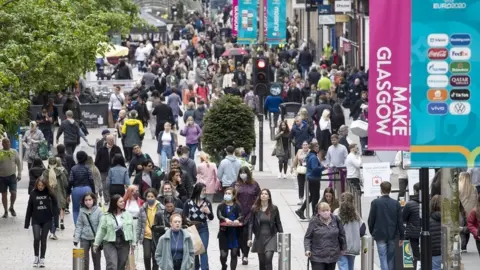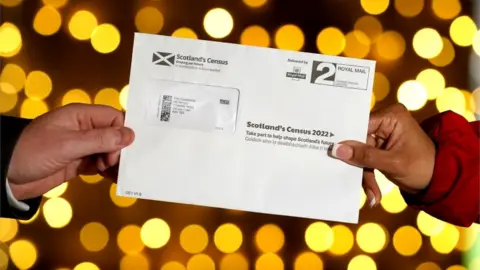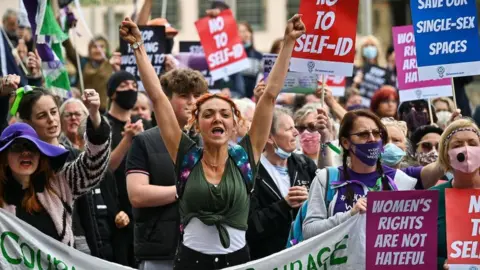Why does every home in Scotland have to complete a census?
 PA Media
PA MediaSunday 20 March is officially Scotland's Census Day. Every single person in the country must be accounted for in this once-in-a-decade survey.
The census collects information which helps the Scottish government and other organisations make sure they provide the right services for people.
Census letters have been issued to more than 2.7 million households, representing 5.5 million people.
More than one million households have already completed the survey.
What is the census?
The census records information on the country on a particular day. It takes place every 10 years, normally on a year ending with a number one.
It provides a snapshot of the population, including its size and the age of people.
The census has taken place in Scotland every decade since 1801. This year is the first time the census has been postponed since 1941, during World War Two.
England, Wales and Northern Ireland went ahead with their 2021 plan, but the Scottish government chose to defer its census for a year due to disruption from Covid.
What is the purpose of the census?
 Getty Images
Getty ImagesThe census asks questions on a range of topics, including the types of accommodation people live in, household relationships, age, sex, health and employment status.
The information provided is used by charities and services like hospitals, schools, universities and job centres to plan and fund services including transport, education and healthcare.
It helps plan future infrastructure, as well as giving a breakdown of the population and ethnic make-up of Scotland.
It can tell authorities where extra services might be needed for a larger elderly population, where mental health provision might be needed or if a particular area has issues with unemployment.
Do I have to complete the census?
 Wales News Service
Wales News ServiceIt is a legal responsibility to complete the census. Everyone must complete or be accounted for in the census. You can be fined up to £1,000 if you do not fill it in, or give false information.
But you do not have to answer the questions marked as voluntary.
People living in the UK for less than six months should be included as a 'visitor' at the address where they are staying on census day.
If you filled out a census in another part of the UK in 2021, you still have to complete Scotland's 2022 census.
Households have been able to send their forms in or complete them online since 28 February. But the responses have to reflect the household's circumstances on Census Day itself.
You may be prosecuted if you refuse to complete it, don't answer a question or give false information.
What is new in the census?
 Getty Images
Getty ImagesNew questions for the 2022 census include whether people use British Sign Language (BSL), which passports they hold, and previous armed forces history.
New voluntary questions have been included on sexual orientation and trans status. Census guidance allows people to identify as male or female regardless of what is on their birth certificate.
This question faced a legal challenge from the group Fair Play for Women which claimed this was in breach of existing legal definitions of sex and gender.
However, a Scottish judge threw out the challenge saying an answer given in "good faith and on reasonable grounds" should not be seen as false.
How do I complete the census?
Every household has been sent a letter with instructions on how to complete the census. Paper forms can be requested, but it is expected that this will be the first year that most census forms are completed online.
The letter contains a unique access code which will let you log in to do this. You can start your census form here.
The Census website also includes a video tutorial on how to complete the form.
